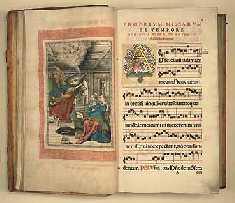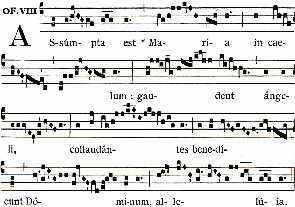The Strange Rejection
of the Roman Gradual
by Kurt Poterack
This article appeared in the Summer 2008 edition of Sacred Music journal, published by the Church Music Association of America, observing the 100th anniversary of the publication of the Graduale Romanum.
It is reprinted with the kind permission of Jeffrey Tucker, Managing Editor.
 You want to do a "tract" during Lent?
I have been a priest for seventeen years and have never heard of such a thing as a "tract"!
You want to do a "tract" during Lent?
I have been a priest for seventeen years and have never heard of such a thing as a "tract"!
You choose such overly long Alleluias.
They are out of proportion with the Liturgy of the Word!
Why can't we have a grand, glorious opening hymn instead of these "introits" that you insist upon?
You are violating church law by replacing the opening hymn with a prayer of your own choosing [i.e., the introit specified in the Roman Gradual].
In the approximately fifteen years that I have been involved in church music, these are just some of the more egregious comments I have received in response to my attempts to preserve the church's treasury of sacred music by using the Graduale Romanum.
In each case I was accused of doing something (willfully, illicitly — even maliciously) that, in the mind of the accuser, was at best a strange novelty or at worst a violation of the established order of things.
One thing that was interesting to me was that in each case, the accuser — whether lay or cleric — was an orthodox, believing Catholic.
Another thing that was interesting and ironic was that in each case — even though I was following the Church's liturgical books to the letter — I was in essence accused of trying to impose my personal, subjective taste on the congregation.
In particular, I remember the look on the face of the gentleman who chastised me for choosing "such overly-long Alleluias."
When I told him that I simply do the ones assigned for the particular Sunday in the Church's official liturgical book — the Graduale Romanum — he looked at me as if I gad just spoken gibberish.
What I had said was incomprehensible to him.
(A further irony was that he enjoyed going to Mass where a particular priest would preach half-hour-long homilies virtually every Sunday — apparently this was not out of proportion with the Liturgy of the Word!)
As wrong, unintentionally ironic, and even humorous as these attitudes are to us church musicians in the know, they are ultimately instructive.
One could ascribe these attitudes to the recent course of history — how the hymn option was pressed in the immediate aftermath of the council to facilitate "active participation."
One could also take a more long-term view of history and trace the development of vernacular hymnody back to the Middle Ages, as I have done in previous editorials.
However, I think it is more important to realize that these attitudes represent the way many — if not most — Catholic today think about the Divine Liturgy.
Not just liturgical music but the liturgy itself, for what is the liturgy but the Opus Dei, the Work of God?
And yet many Catholics assume that the liturgy is not primarily about the glorification of God, but — at best — primarily about their own sanctification.
 There has been a fundamental breakdown in the Catholic conception of the Divine Liturgy.
There has been a fundamental breakdown in the Catholic conception of the Divine Liturgy.
This is typical of the Protestant self-reflective turn inward.
Luther was obsessed with his own salvation and that became his point of absolute certitude.
His "spiritual descendents" think they can infallibly know that, beacuse they have accepted Jesus Christ as their personal Lord and Savior, they will be saved — and yet many Protestants disagree with each other on some of the most basic aspects of the faith (How many sacraments are there?
What is the structure of the Church?
Or even, what is the nature of God?).
The Church's position, however, has always been that the objective external deposit of faith can be known with infallible certitude, but that our personal subjective fate is ultimately dependent upon human free will and our choice of God's offer of salvation for every moment into a future which we cannot know for certain.
Similarly the liturgy should be reflective of that grand objective structure that is the Church, that is the Faith, that is the Kingdom of Heaven.
Oddly, many conservative Catholics have a view of the liturgy that I call a Methodist service with the Real Presence.
They want inspiring hymns, they want doctrinally orthodox homilies — and they want communion.
They may believe the depositum fidei —and they will get upset about liberals engaging in egregious liturgical abuses or refusing them communion while kneeling — but they seem to have an otherwise self-serving approach to worship.
They want primarily to "get something out of it."
It is a curious melding of the quick, efficient low Mass of old — the sacrament validly confected with proper form and matter — with an "inspirational service" feel of a somewhat Protestant nature.
And all this is done for the benefit of the individual's spiritual growth.
It is the antithesis of what the leaders of the pre-conciliar liturgical movement in its classical phase had in mind.
It is absolutely contrary to the classic Catholic conception of the liturgy — whether of the West of the East.
But there you have it.
The more I think about it, in fact, the more it seems that it is perhaps not so much Protestant anymore as it is a modern view: subjective, individualistic, and — strangely enough — legalistic.
This would explain the reactions I have received: "You are doing something which I as an individual do not like, so therefore it must be something that you as an individual like (and are imposing on me), and (quite irrationally) it therefore must also be against the law."
There is at least a nominal belief in an objective order outside the individual, but what is lacking is a symbol system — within the liturgy, in this case — to express it.
There is a cognitive dissonance, an unspoken disconnect, at work.
While God, his creation, the moral law, and truth are all objective, the liturgy is for me.
I contend that it is this that is at the root of the strange rejection of the Roman Gradual.
Kurt Poterack is choirmaster at Christendom College in Front Royal VA.
| 


